In normal times, June is not the month for tax professionals to consider tax strategies for current-year returns. Of course, these are not normal times. The government response to the coronavirus threat has included a panoply of legislation and agency actions that has opened up a number of opportunities for taxpayers to lessen their taxes owed on 2020 returns.
For starters, there’s the extension of the filing date itself, from April 15 to July 15, 2020. “That gives an additional 90 days to fund all IRA contribution types, including SEP IRAs,” said New York tax preparer John Sheeley, adding that the filing date change also extends the ability to make contributions to qualified retirement plans, and health savings accounts.
Then there’s the net operating loss rules, according to Ken Weissenberg, tax partner and co-chair of the real estate practice at Top 100 Firm EisnerAmper.
“The NOL rules were changed fairly dramatically by the Tax Cuts and Jobs Act,” he noted. “The carryback period was eliminated for 2018 and forward,. Under the CARES Act, NOLs can now be carried back from 2018, 1019, and 2020.”
The CARES Act corrected a mistake made by the drafters of the TCJA, observed Weissenberg. Due to the error, qualified improvement property was not included in the list of property with a 15-year life, and so was not eligible for bonus depreciation on property placed in service after Jan. 1, 2018.
“The corrected language now creates the opportunity for people to file amended returns for 2018, or 2019 if it was already filed, revoke the real property business election under Code Section 163(j) and then take bonus depreciation on leasehold improvements which were placed in service in 2018 or 2019 or to those that will be placed in service in 2020. It creates a situation where there might not have been a loss on the original return, but a loss can be created on the amended return.”
For corporations, the rate is 21 percent, Weissenberg noted, “but if you carry back a loss for five years, the rate was 35 percent, so you get the benefit of using the loss at a much higher tax rate. You get rate arbitrage on top of a quick refund. And they extended the time to apply for quick refunds for both corporations and individuals by six months.”
Another possibility is the lifting of the limitation on excess business losses of Code Section 461(l), according to Edward Renn, a partner in the private client and tax team at law firm Withers Bergman LLP. “The limitation, added by the TCJA, impacted a lot of entrepreneurs,” he said. “There might be a lot of these losses sitting there since 2018 or 2019. Now, these have been freed up because the limitation has come off.”
The Employee Retention Credit, while not tied to the July 15 date, is a significant refundable credit, Renn observed: “It’s equal to 50 percent of qualified wages paid to employees after March 12, 2020, and before January 1, 2021. The maximum credit amount is $5,000 per employee.”
A declared disaster
Under Code Section 165(i), if a taxpayer has a loss in a disaster area attributable to a federally declared disaster, the taxpayer may elect to treat the loss as occurring in the immediately preceding taxable year. For the first time in U.S. history, the entire nation was declared a disaster zone on March 13, 2020.
“The coronavirus pandemic is nationwide and not geographically specific,” indicated Bill Smith, managing director in the national tax office of Top 100 Firm CBIZ MHM. “For both individuals and businesses, this is an opportunity to reduce their 2019 amount due.”
“For example, a taxpayer owns 20 restaurant franchises, and gets a shut-down order on March 20. The taxpayer might suffer several hundred thousand dollars in loss due to food spoilage,” he explained. “Or a taxpayer owned stock in an industry hit by the pandemic, and decides to sell and take a loss. It shouldn’t matter whether the sale is before the declared date of the disaster — a disaster is always declared after the damage is done.”





